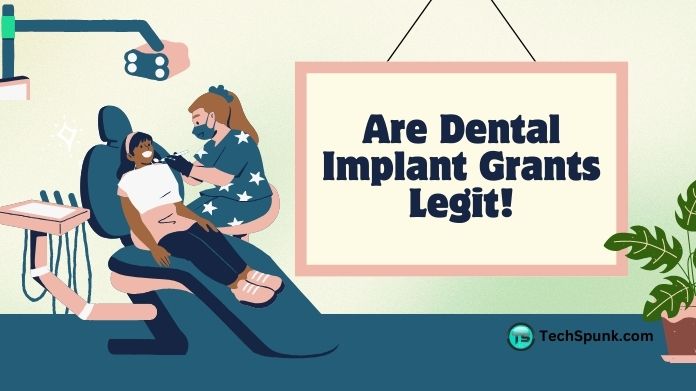Are you considering enhancing your smile with dental implants but are concerned about the cost? You may have heard of dental implant grants and asked, “Are dental implant grants legit?”
So, let’s discuss what you should know about dental implants and the support programs available.
Techspunk delves into the realities of these awards, attempting to determine whether they are a legitimate alternative for individuals seeking to invest in their smiles.
Dental health is so important for well-being and confidence, and recognizing the validity of these awards might be the first step toward getting a healthier, happier smile without breaking the budget.
Let’s look are dental implant grants legit and how they might potentially improve your dental care journey.
Table of Contents
Understanding Dental Implant Grants

Dental implant grants are programs that provide free or affordable dental treatments to individuals and families who are unable to afford them.
To qualify for the dental implant program, you must meet certain financial criteria and be able to cover any additional dental treatment expenses.
In the cosmetic dentistry grant program, you can apply for a substantial monetary grant to reduce the cost of a full-mouth dental implant.
The program is appreciated by low-income individuals and families who suffer from the emotional and physical repercussions of tooth loss, thus having better health and quality of life.
The inquiry “Are Dental Implant Grants Legit” is crucial for those seeking financial assistance for dental implants, highlighting the importance of these programs in enhancing access to necessary dental care.
How Dental Implant Grant Works?
Dental implant grants work by providing financial assistance to individuals who need dental implants but cannot afford the full cost of the procedure.
The process typically involves several key steps:
- Research and Identification of Grants: Start by finding dental implant grants from dental associations, non-profits, government programs, or dental clinics.
- Eligibility Check: Review the grant’s eligibility criteria, such as financial need, dental issue severity, residency, age, or employment status, to ensure you qualify.
- Application Process: If eligible, fill out the application with required documents like income proof, dental records, and a personal statement.
- Assessment and Selection: Grant providers will assess applications based on their criteria, which could involve a committee review or a lottery system.
- Approval and Funding: Successful applicants will be notified, and grants will cover partial to full procedure costs.
- Coordinating with Dental Providers: Work with a dentist who accepts the grant, following the program’s guidelines for provider selection.
- Undergoing the Procedure: Proceed with the dental implant procedure, with costs covered as per the grant’s value.
- Post-Procedure Requirements: Complete any follow-up actions required by the grant, such as surveys or reports.
- Alternative Financial Options:
Pros and Cons of Dental Implant Grants
Dental implant grants, similar to other forms of financial assistance, have their own advantages and disadvantages.
It is crucial to carefully consider these aspects in order to determine whether applying for such a grant aligns with your dental health requirements and financial circumstances.
When questioning ‘Are Dental Implant Grants Legit,’ it’s essential to research and understand the legitimacy and conditions of these grants to ensure they meet your needs without unforeseen complications.
Pros
- Financial Assistance: The most significant advantage is the financial relief they provide. Dental implants can be quite expensive, and these grants can significantly reduce the financial burden.
- Access to Dental Care: Grants increase access to dental care for individuals who might otherwise be unable to afford implants, improving their oral health and overall quality of life.
- Improvement in Oral Health: Dental implants are a durable and effective solution for missing teeth. They help maintain jawbone integrity and overall oral health.
- Potential for Comprehensive Care: Some grant programs may offer additional dental services alongside the implant procedure, ensuring a more comprehensive approach to oral health.
Cons
- Limited Availability: Grants are not always readily available to everyone who needs them, and there might be strict eligibility criteria.
- Partial Coverage: Many grants only partially cover the cost of the dental implant procedure, meaning recipients may still need to pay a significant portion out-of-pocket.
- Complex Application Process: The application process can be lengthy and complicated, requiring detailed documentation and sometimes a waiting period.
- Potential Scams: The presence of scams in the guise of dental implant grants necessitates careful research and scrutiny, adding an extra layer of diligence required by applicants.
Are Dental Implant Grants Legit?
The answer to ‘Are Dental Implants Grants Legit?’ is yes, it can be legitimate, offering valuable financial assistance to those in need of dental implants but facing financial constraints.
These grants are offered by reputable organizations such as dental associations, non-profit groups, and recognized dental practices.
The main objective of these grants is to make dental care more accessible to those who are in need but face financial constraints.
However, it is important to exercise caution as the realm of dental grants, like other forms of financial aid, can also be susceptible to scams.
Legitimate grants have a transparent application process and clear eligibility criteria and do not guarantee a grant to all applicants or require payment to apply.
They also provide detailed information about what the grant covers and any obligations for the recipient.
To ensure one is engaging with a genuine grant program and avoiding scams, it is crucial to thoroughly research the source of the grant and seek advice from dental professionals or consumer protection agencies.
What Are the Types of Dental Implant Grants?

- Government-Funded Grants: Grants provided by governmental health departments or agencies, aimed at low-income individuals, seniors, veterans, or those with special health needs.
- Non-Profit and Charitable Organization Grants: Grants offered by various non-profits focused on dental or overall health care, targeting specific demographics such as underprivileged communities, children, or the elderly.
- Dental School Programs: Grants or reduced-cost dental services, including implants, are provided by dental schools as part of their training programs, with care given by dental students under supervision.
- Private Dental Practice Grants: Grants offered by dental practices as a community service initiative, which may be need-based or merit-based and require treatment at the practice providing the grant.
- Corporate Sponsored Grants: Grants funded directly by corporations, particularly in the healthcare sector, or through partnerships with dental organizations.
- Specialized Grants: Grants specifically target groups such as cancer survivors, individuals with certain disabilities, or veterans, addressing their unique dental needs, including implants.
Frequently Asked Questions
Q. Are Dental Implant Grants Legit/Real?
Ans. Yes, they are real and offered by various organizations, but it’s important to verify their legitimacy.
Q. How Can I Identify a Legitimate Dental Implant Grant?
Ans. Look for transparency in the application process, clear criteria, no application fees, and reputable backing organizations.
Q. Do These Grants Cover the Full Cost of Dental Implants?
Ans. It varies; some might cover the full cost, while others only a portion.
Q. What Are Common Eligibility Criteria for These Grants?
Ans. Criteria often include financial need, specific dental conditions, and sometimes demographic factors like age or veteran status.
Q. Are There Risks in Applying for Dental Implant Grants?
Ans. Main risk is encountering scams. Be wary of guarantees or upfront payment requests.
Wrap Up!
Dental implant grants are legitimate financial support opportunities provided by reputable organizations to ensure that individuals in need can access dental implants.
However, it is crucial to approach these grants with caution and thoroughness. You must verify the credibility of the grant provider, fully understand the terms and conditions, and be wary of any red flags that may indicate potential scams, such as upfront payment demands or promises of guaranteed approval.
Through diligent research and selecting genuine grants, individuals can greatly improve their dental health and overall well-being with the financial aid offered by these programs.





